To maximize your running performance, timing your nutrition is key. Aim to eat a carb-rich meal 3-4 hours before your run to boost glycogen stores. Have a light snack, like a banana, 30-60 minutes prior for immediate energy. Stay hydrated with 500-700ml of fluids a few hours before running. After your run, refuel with carbs and protein for recovery within an hour. Discover more ways to optimize your nutrition for better results.
Key Takeaways
- Consume a carb-rich meal 3-4 hours before running to maximize glycogen stores and energy availability.
- Eat a light snack, like a banana, 30-60 minutes prior to enhance immediate energy levels.
- Hydrate with 500-700ml of fluids 2-3 hours before running to optimize performance.
- After running, prioritize consuming 68-102 grams of carbohydrates with protein for effective recovery.
- Avoid high-fat, high-fiber, and spicy foods before running to prevent gastrointestinal discomfort.
The Importance of Meal Timing for Runners

Meal timing plays an essential role in your running performance, as it directly impacts your energy levels and endurance. Consuming a carbohydrate-rich meal 3-4 hours before running helps maximize your glycogen stores, which enhances your endurance during longer workouts.
The night before a run, a carb-rich dinner is vital for sustaining energy levels. Additionally, eating a quick, easily digestible carbohydrate-rich snack, like a banana or a sports drink, 30-60 minutes prior to your run enhances energy conversion and reduces the risk of gastrointestinal discomfort.
Proper meal timing guarantees you maintain peak performance by allowing for a larger carbohydrate intake, supporting high-intensity runs, and preventing hunger during exercise, ultimately leading to a more enjoyable and effective running experience. Furthermore, maintaining proper nutrition is essential not only for energy but also for overall cognitive and emotional well-being, which can positively influence your running performance.
Optimal Pre-Run Meal Timing
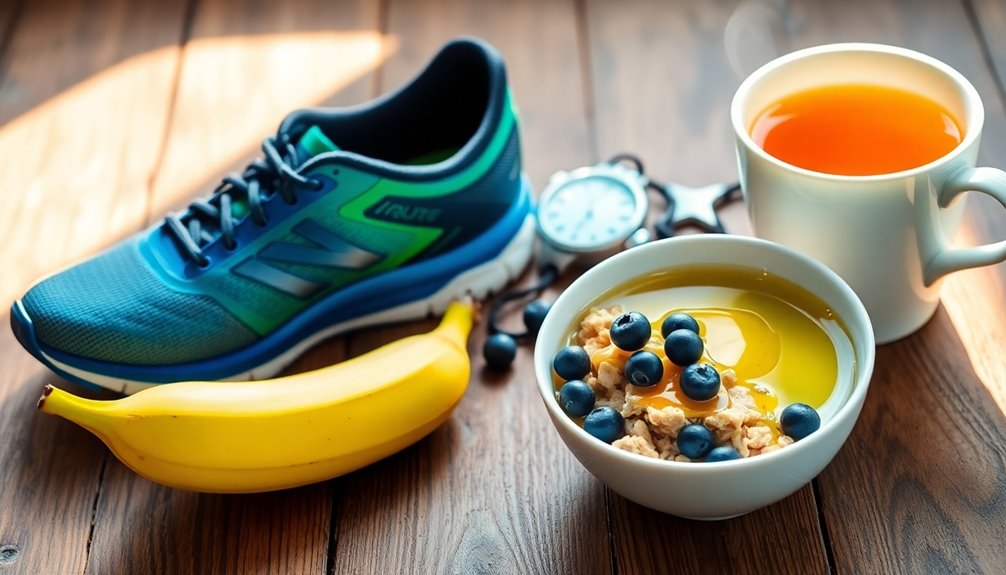
Timing your pre-run meal is essential for achieving ideal performance. To maximize your muscle glycogen stores, consume a carbohydrate-rich meal 3-4 hours before running. This enhances your endurance exercise capability and sets you up for success.
Aim to eat at least 1 hour prior to your run to allow your body to digest and convert energy effectively. If you need a quick boost, a snack like a banana or a sports drink within 30-60 minutes before running can provide the immediate energy you need.
Also, don't forget that a carb-rich dinner the night before greatly contributes to glycogen stores, ensuring you're fueled for your activity and preventing hunger or gastrointestinal discomfort during your run. Additionally, consuming antioxidant-rich foods can further support your overall health and performance during training.
Recommended Foods Before Running
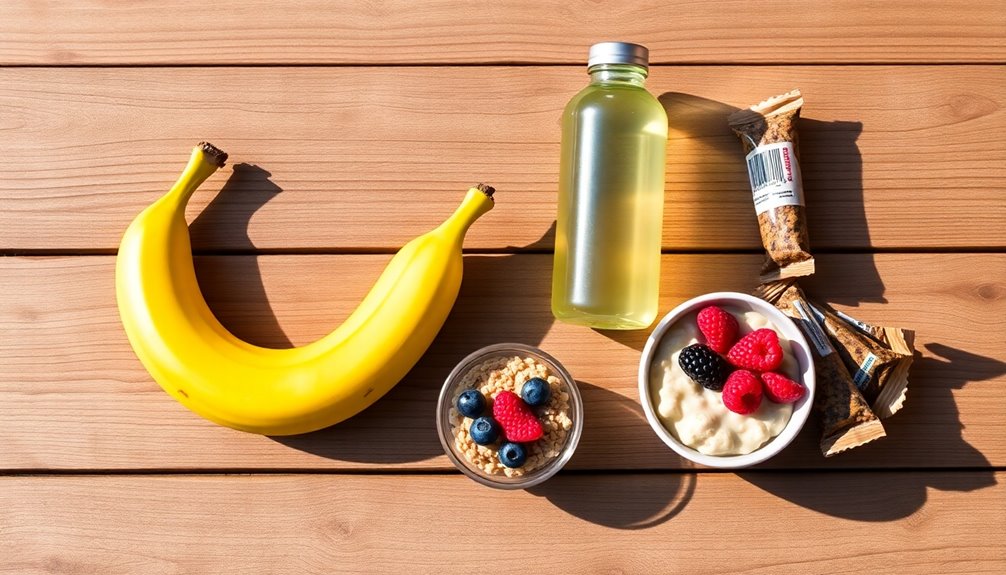
When you're gearing up for a run, choosing the right foods can make all the difference. Focus on carb-rich meal options and quick snacks that fuel your energy without causing discomfort. Remember to steer clear of high-fat or spicy foods to keep your stomach happy and your performance strong. Incorporating low carb high protein breakfast ideas can also provide sustained energy for your running routine.
Carb-Rich Meal Options
Incorporating carb-rich foods into your pre-run routine can greatly boost your performance. Consuming a carb-rich meal 3-4 hours before your run helps maximize glycogen stores, enhancing your endurance.
Consider options like currant dumplings with cinnamon sugar or mango coco pancakes with syrup, which offer easily digestible carbohydrates. These meals not only fill your glycogen reserves but also provide the energy boost you need for a successful run.
If you're carb-loading the night before a long run, focus on meals like pasta or rice to considerably increase glycogen availability for race day. Additionally, understanding the importance of legal representation can help alleviate stress related to personal matters during your training.
Timing your meals around your running schedule will guarantee ideal digestion, preventing hunger and discomfort while you exercise.
Quick Pre-Run Snacks
Having the right quick pre-run snacks can make all the difference in your performance. You want snacks that are easily digestible and packed with carbohydrates to give you that much-needed energy boost. Aim to eat these snacks about 30-60 minutes before your run for ideal pre-run nutrition. Here are some great options:
| Snack | Carbohydrates (g) | Benefits |
|---|---|---|
| Banana | 27 | Quick energy source |
| Oatmeal | 27 | Sustained energy release |
| Toast with honey | 15 | Gentle on the stomach |
| Energy gel | 22 | Quick absorption |
| Cereal bar | 30 | Convenient and portable |
Choosing the right quick pre-run snacks can help you maximize your running performance effectively! Understanding cravings during pregnancy may also influence your choice of snacks, as certain foods can provide the necessary energy boost for optimal performance.
Foods to Avoid
To guarantee ideal running performance, it's crucial to steer clear of certain foods that can hinder your efforts.
First, avoid high-fat foods, as their slow digestion can lead to cramping and sluggishness.
High-fiber foods, like beans and whole grains, should also be on your list of foods to avoid right before running; they can cause gas and bloating.
Additionally, be cautious with spicy foods, which may trigger gastrointestinal discomfort during your run.
Monitor your caffeine intake, too, since it can stimulate your gastrointestinal tract.
Finally, limit foods with added sugars and simple carbs just before a run to prevent quick spikes and drops in blood sugar levels, impacting your energy and performance. Maintaining a clean and organized environment can also support a healthier lifestyle by promoting cleanliness and hygiene, which may positively influence your overall performance.
Understanding Carbohydrates and Their Role

While you might focus on endurance and speed during your runs, understanding carbohydrates and their essential role in your performance is equally important. Carbohydrates are your primary energy source, fueling your muscles and aiding recovery.
Here are three key points to reflect on:
- Glycogen Stores: You need about 500 grams of carbohydrates to replenish glycogen for 60-90 minutes of running.
- Pre-Run Intake: Consume 1 gram of carbohydrates per kilogram of body weight about an hour before your run to maximize energy levels.
- During and After Runs: For runs over 60 minutes, aim for 30-60 grams of carbohydrates per hour, increasing to 60-90 grams for longer efforts.
Post-exercise, 1.0-1.5 grams per kilogram helps with recovery. Additionally, incorporating anti-inflammatory foods can support overall performance and recovery by reducing muscle soreness and promoting healing.
Hydration Strategies for Runners
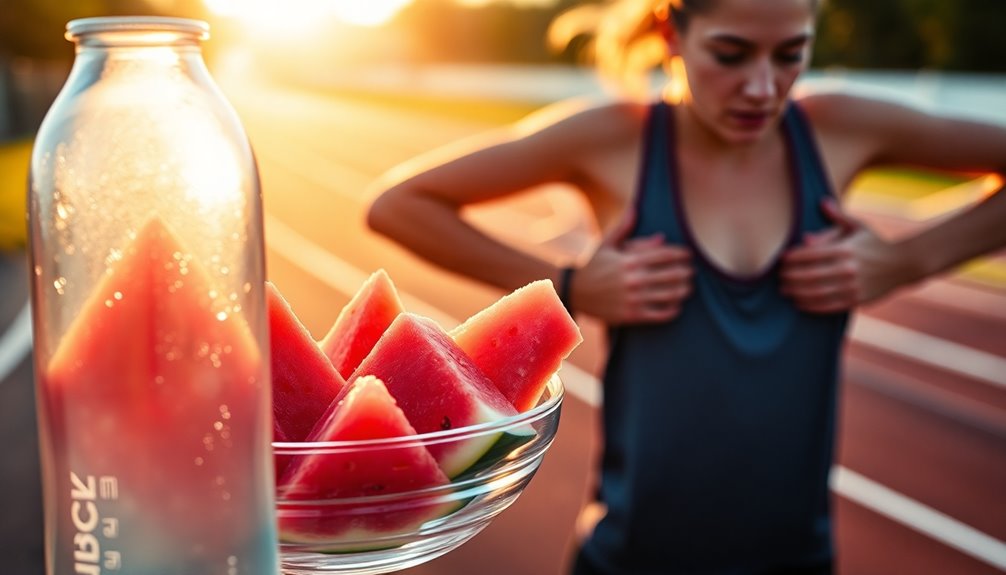
To stay properly hydrated, aim to drink 500-700ml of fluids 2-3 hours before your run. During long runs, you should consume 700-900mg of sodium per hour to replace lost electrolytes and prevent cramps.
Most runners lose about 1,200ml of sweat per hour, so it's vital to monitor your hydration based on your individual sweat rate. Start hydrating 24 hours before a race with electrolyte-rich fluids to maintain sodium balance. Raisins can cause acute kidney failure in dogs, so it's important to choose your hydration sources wisely and ensure they are safe and effective for your body.
Watch for signs of dehydration like dark yellow urine, fatigue, or dizziness, as staying hydrated can greatly enhance your overall running performance.
Post-Run Nutrition: What to Eat and When
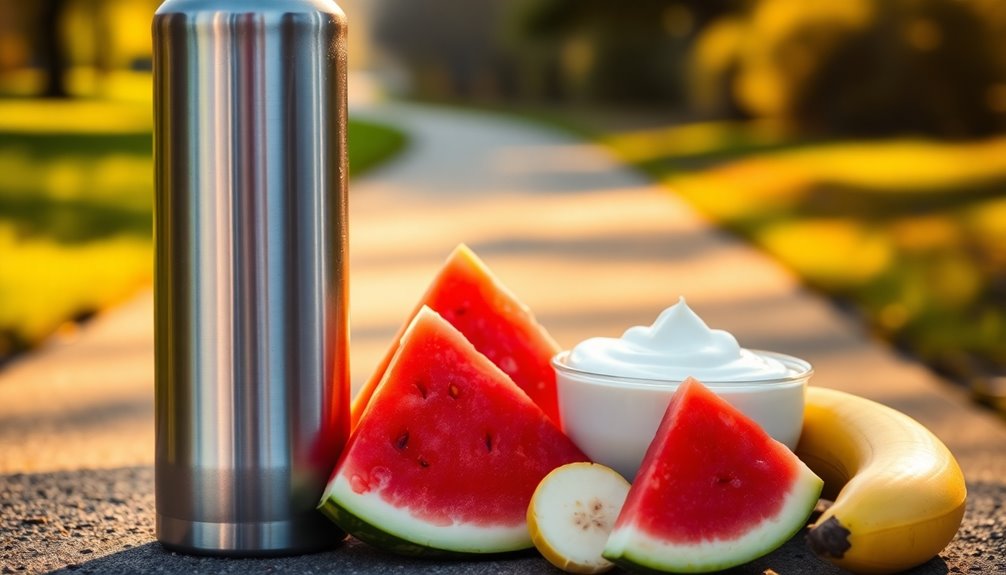
As you cross the finish line, your body craves the right nutrients to kickstart recovery and restore energy levels. Focus on post-run nutrition within the first 30 minutes to optimize glycogen replenishment and muscle recovery.
Remember these key elements:
- Carbohydrates: Aim for 1.0-1.5 grams per kilogram of body weight. For a 150-pound athlete, that's about 68-102 grams immediately after running.
- Protein: Pair your carbs with 15-25 grams of protein within one hour to enhance muscle repair.
- Hydration: Replenishing fluids is essential for effective recovery and maintaining performance levels.
Convenient options include smoothies, low-fat chocolate milk, and wraps, which provide the perfect balance of carbohydrates and protein. Additionally, incorporating low-carb meal options like a Turkey Bean and Tomato Zoodle Bowl can further support your recovery efforts.
Prioritize these to feel your best!
Foods to Avoid Before Running
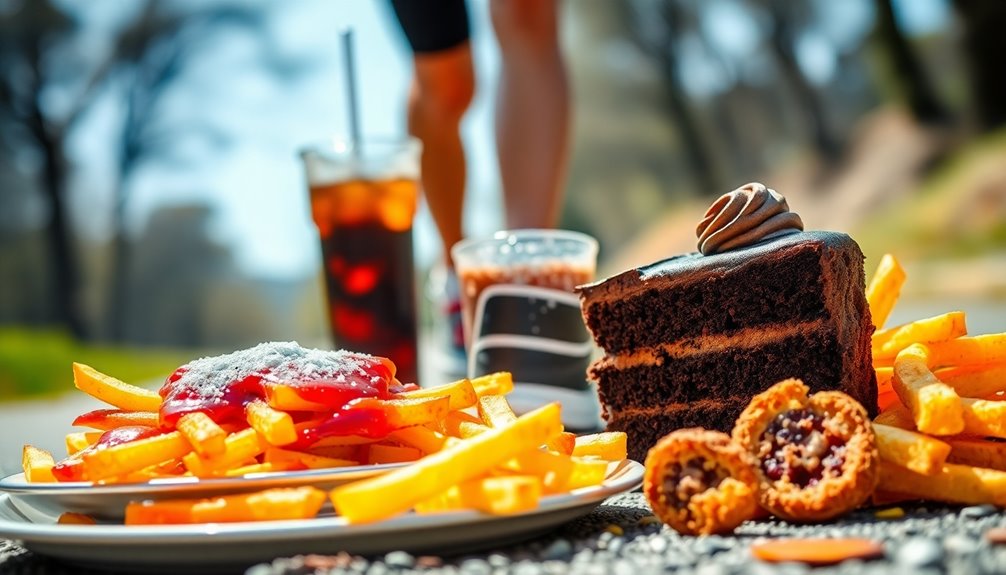
Before you hit the pavement, steer clear of high-fat foods, spicy dishes, and high-fiber options. These choices can lead to discomfort, cramping, and bloating, all of which can hinder your performance. Additionally, it's important to avoid toxic foods for birds that may cause health issues, as similar principles apply to nutrition in other contexts.
High-Fat Foods
While it might be tempting to indulge in high-fat foods like fried items or fatty meats, doing so right before a run can greatly hinder your performance.
Consuming these foods can slow digestion, leading to gastrointestinal distress, cramps, and nausea. To maintain peak carbohydrate utilization and energy levels, keep your pre-run meal light and balanced.
Here are three high-fat foods to avoid:
- Fried items (like french fries)
- Fatty meats (like bacon or sausage)
- Processed snacks (like chips and heavy desserts)
Spicy Dishes
High-fat foods aren't the only culprits that can derail your running performance; spicy dishes can pose a significant risk too. Consuming spicy foods close to running can lead to gastrointestinal distress, including heartburn and cramping. This discomfort distracts you and can slow down your digestive system, making you feel heavy and lethargic. To optimize your performance, it's best to avoid spicy dishes for several hours before a run.
| Spicy Dishes | Potential Issues | Recommended Timing |
|---|---|---|
| Chili | Nausea, heartburn | At least 3 hours prior |
| Hot curry | Cramping, digestive upset | 4-6 hours prior |
| Spicy tacos | Increased acid production | 4 hours prior |
High-Fiber Options
When planning your meals before a run, it's important to be mindful of high-fiber foods, as they can lead to gastrointestinal discomfort.
Consuming these foods too close to your workout may cause bloating and cramping, impacting your performance. To minimize digestive issues, aim for low-fiber options that provide quick energy availability.
Here are three high-fiber foods to avoid before running:
- Beans
- Whole grains
- Certain fruits and vegetables
Instead, choose low-fiber snacks like bananas, white rice, or sports gels, which are easier to digest and will keep you fueled without the risk of needing bathroom breaks.
The Impact of Nutrition on Hormonal Balance

Nutrition plays an essential role in maintaining hormonal balance, especially for runners seeking ideal performance. After intense workouts, your body experiences hormonal shifts; ghrelin rises, signaling hunger, while leptin drops, potentially leading to fat storage.
To combat this, focus on your post-exercise nutrition. Consuming carbohydrates replenishes glycogen and stimulates insulin release, aiding muscle recovery. Pairing this with adequate protein intake promotes muscle protein synthesis and regulates hormones that control appetite and metabolism.
A balanced post-workout meal with both carbs and protein not only restores hormonal balance but also enhances your recovery and overall running performance. Prioritizing nutrition after your runs helps you maximize training benefits and achieve your running goals effectively.
Experimenting With Timing and Food Choices
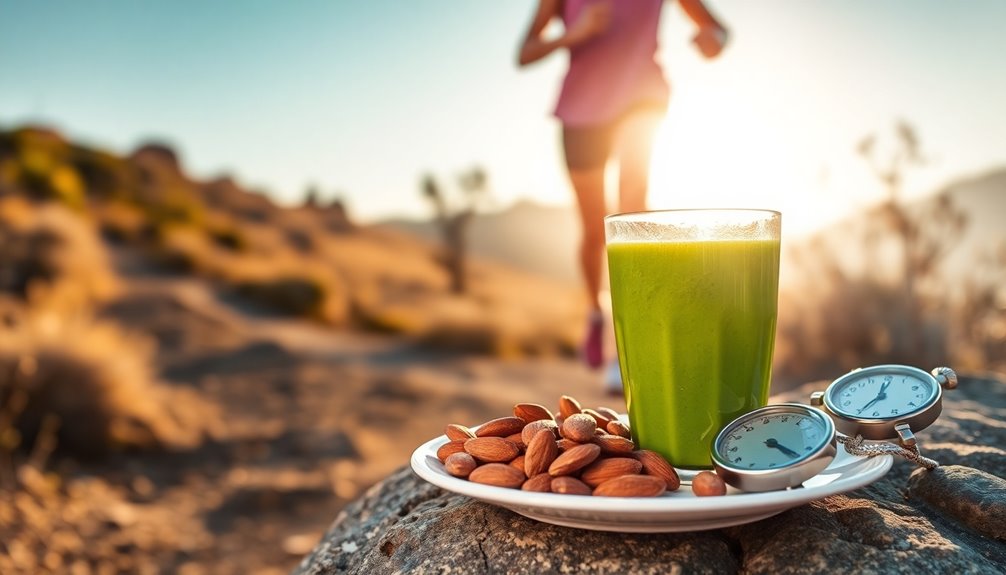
Understanding how to time your meals can greatly enhance your running performance. Experimenting with meal timing helps optimize glycogen storage, which is essential for endurance.
Here are some strategies to take into account:
- Carb-rich meal: Aim to eat a carb-rich meal 3-4 hours before your run to maximize glycogen levels.
- Quick snacks: Consume quick, easily digestible snacks like a banana or sports drink 30-60 minutes prior for an immediate energy boost without gastrointestinal issues.
- Track your responses: Use tools like the FoodCoach App to monitor how different foods and timing work for you, keeping in mind your individual tolerance.
Frequently Asked Questions
What Is the 4 2 1 Eating Rule for Athletes?
The 4 2 1 eating rule for athletes suggests you consume a ratio of four parts carbohydrates, two parts protein, and one part fat in your meals.
This means if you're eating 70g of food, aim for 40g of carbs, 20g of protein, and 10g of fat.
This balance helps maintain your energy levels, supports muscle recovery, and provides essential fats for overall health.
Adjust your portions based on your individual training needs.
What Is the Optimal Nutrient Timing?
Isn't it fascinating how what you eat can amplify your performance?
Ideal nutrient timing involves consuming a carbohydrate-rich meal 3-4 hours before activity to boost your glycogen stores.
About 30-60 minutes prior, grab a quick snack like a banana for that immediate energy kick.
After your run, aim to refuel within 30 minutes, focusing on 1.0-1.5 g of carbs per kg of body weight and 15-25 g of protein for recovery.
What Is the Optimal Nutrition for Running?
To optimize your nutrition for running, focus on a diet rich in carbohydrates, aiming for 60%-70% of your daily intake.
Incorporate lean proteins (15%-20%) and healthy fats (15%-20%) to support your performance and recovery.
Before your run, consume a carbohydrate-rich meal 3-4 hours prior, and have a quick snack like a banana 30-60 minutes before.
Don't forget to hydrate adequately, as it's essential for maintaining your energy and performance levels.
What Is the Optimal Time Between Eating and Running?
Imagine feeling energized and light as you run, versus dragging your feet, weighed down by a heavy meal.
The ideal time between eating and running hinges on your meal size. If you've had a large meal, wait 3-4 hours to let your body digest. For a smaller snack, just 30-60 minutes will do.
Finding this balance keeps you fueled without discomfort, ensuring you enjoy every step of your run.
Conclusion
To truly tap into your running potential, timing your meals is key. By fueling before and after your runs with the right foods, you'll boost your energy, enhance endurance, and speed up recovery. Remember, hydration's vital too, so sip steadily. As you experiment with different combinations, you'll discover what works best for your body. So, embrace this essential element of your training regimen—nourishing nutrition at the right moments can lead to remarkable running results!









